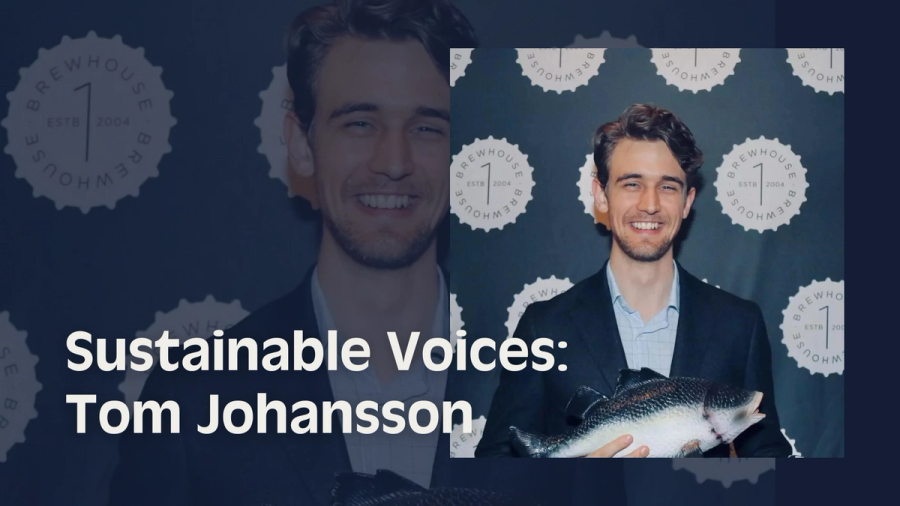Sustainable Voices: Tom Johansson
January 11, 2019
News
Welcome to our Sustainable Voices series, where we talk to inspirational climate leaders around the world about their passions and projects.
Who, What, Where?
Tom Johansson, Co-Founder & CEO, Hooked Seafood, Stockholm. Swedish start-up Hooked is developing what it claims to be the ‘world’s first’ plant-based shredded salmon product. The aim? To meet the ‘rapidly increasing’ demand for seafood with healthy, tasty, and planet-friendly alternatives.
What was your a-ha moment that made you become engaged in sustainability?
My sister became vegan and questioned a lot about what we ate and shared her knowledge about both food and the planet’s health in general. I believe that was the first time I started thinking about how I on a personal level can contribute to a more sustainable future. I believe people around me have proven and inspired me to be able to live more sustainably without making any big sacrifices, it is just a matter of changing your lifestyle.
What is your single best tip for someone who wants to do more for the environment on a personal level?
Our food system makes up to 25% of the total carbon emissions, it is clear that what we eat has a significant effect on every person's carbon footprint. The inefficient meat and seafood industry is putting a lot of pressure on our environment and eating more plant-based are one of the single best things you can do on a personal level. Because plant-based can be tasty, and it is super healthy for your body – if you ask me it is a perfect win-win for a more sustainable future.
What do you think will be the legacy of your generation?
Our generation has brought a lot of innovation to the world. The past 10-20 years mainly within software and digitalization and I believe that we will now move into a decade of Sustainable Innovation. Because the awareness of the challenges we face with our planet is no longer a niche, it is becoming mainstream to contribute to a better planet. We also see more capital flowing into impact-driven startups to scale fast and make an impact on a large scale. This makes me very hopeful about the future and what our generation will bring and be remembered for.
What is the most critical technological breakthrough that needs to happen for the world to reach the 1,5 degree goal?
First, the plant-based and cell-based meat, seafood and dairy will need to find scalable solutions that can change the way we eat and produce our food. Transportation and Electricity are also big parts of today’s carbon emissions. I believe the biggest challenge will be to generate electricity more sustainably as our electricity consumption is increasing very rapidly. I have seen companies working on generating electricity from thin air, floating solar panels in the ocean and more which I believe are exciting and something that needs to happen for the world to reach the 1.5-degree goal.
What will this breakthrough demand from us as a society?
We all need to be open-minded and be willing to pay a higher price for sustainable solutions for a while. The market trends and needs will have to come first to motivate companies to innovate for a more sustainable future. If there is not a market, companies will in most cases go for the more profitable low hanging fruit. Do everything you can on a personal level and ask yourself “how would the world look like if everyone lived like me?” and then the great sustainable innovations will come.
What is your company’s most impactful contribution to fight climate change?
Seafood consumption is increasing rapidly and both our supply from wild harvest and fish pharms are putting a lot of pressure on our climate. In wild harvest, we have challenges with overfishing which threatens species and marine ecosystems to go extinct. In fish farms, the capacity is so maximized and dense that they need pesticides to keep it clean. This combined with all the faeces and carbon footprint from the farms is unhealthy for the ocean. Our Hooked Seafood offers a delicious plant-based alternative that can meet this increasing demand for seafood and be produced in large volumes without harming the ocean. It also excludes all the microplastics, mercury and PCBs that are in our ocean and consequently most of the seafood we eat today.
In your industry, what do you think will be the most groundbreaking change over the next 10 years?
The plant-based products will just become better and better over the next ten years. Currently, we are in an early stage where the price is slightly premium to traditional meat and seafood as most plant-based companies have not achieved the same production scale as the traditional industry has created over the last 100 years. Also, plant-based companies can innovate and optimize the taste experience in a completely different way vs the traditional industry. When we have come to a point where plant-based products are tastier, healthier, and cheaper than traditional meat & seafood – we can expect a big change to happen very fast.
Which brand (in general) do you think is at the forefront when it comes to sustainability?
I believe Impossible Foods, Oatly and Tesla are the pioneers that have proven that companies with sustainability at its core have tremendous monetary potential as well.
What makes you climate positive about the future?
We are seeing a lot of positive change currently both from the market and from industry starting to actually prioritizing sustainability and not just talking about it. Both disruptive solutions from startups and an existing industry that wants to become more sustainable within their paradigm make me hopeful and climate positive.

POLICIES
PRODUCT